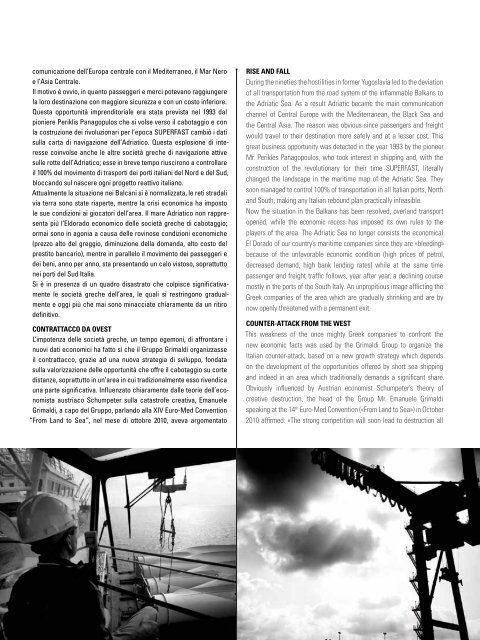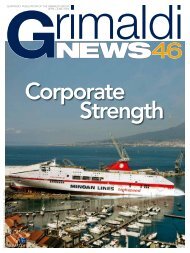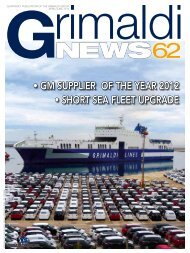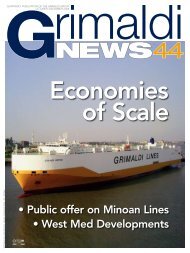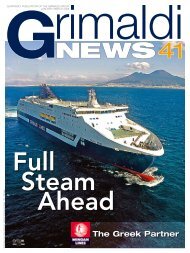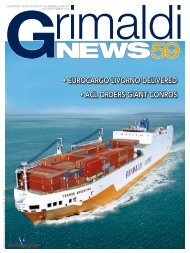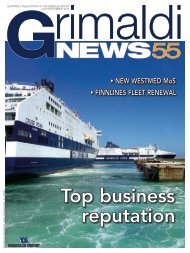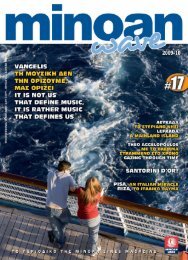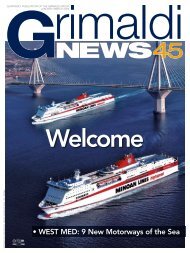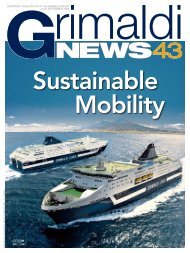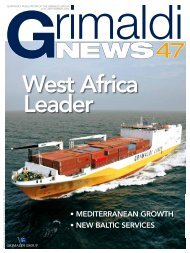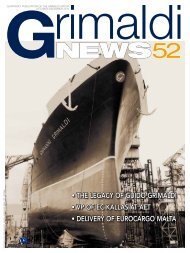umenitsa - Patras - Grimaldi Group
umenitsa - Patras - Grimaldi Group
umenitsa - Patras - Grimaldi Group
You also want an ePaper? Increase the reach of your titles
YUMPU automatically turns print PDFs into web optimized ePapers that Google loves.
marenostrum<br />
22<br />
comunicazione dell’Europa centrale con il Mediterraneo, il Mar Nero<br />
e l’Asia Centrale.<br />
Il motivo è ovvio, in quanto passeggeri e merci potevano raggiungere<br />
la loro destinazione con maggiore sicurezza e con un costo inferiore.<br />
Questa opportunità imprenditoriale era stata prevista nel 1993 dal<br />
pioniere Periklis Panagopulos che si volse verso il cabotaggio e con<br />
la costruzione dei rivoluzionari per l’epoca SUPERFAST cambiò i dati<br />
sulla carta di navigazione dell’Adriatico. Questa esplosione di interesse<br />
coinvolse anche le altre società greche di navigazione attive<br />
sulle rotte dell’Adriatico; esse in breve tempo riuscirono a controllare<br />
il 100% del movimento di trasporti dei porti italiani del Nord e del Sud,<br />
bloccando sul nascere ogni progetto reattivo italiano.<br />
Attualmente la situazione nei Balcani si è normalizzata, le reti stradali<br />
via terra sono state riaperte, mentre la crisi economica ha imposto<br />
le sue condizioni ai giocatori dell’area. Il mare Adriatico non rappresenta<br />
più l’Eldorado economico delle società greche di cabotaggio;<br />
ormai sono in agonia a causa delle rovinose condizioni economiche<br />
(prezzo alto del greggio, diminuzione della domanda, alto costo del<br />
prestito bancario), mentre in parallelo il movimento dei passeggeri e<br />
dei beni, anno per anno, sta presentando un calo vistoso, soprattutto<br />
nei porti del Sud Italia.<br />
Si è in presenza di un quadro disastrato che colpisce significativamente<br />
le società greche dell’area, le quali si restringono gradualmente<br />
e oggi più che mai sono minacciate chiaramente da un ritiro<br />
definitivo.<br />
CONTRATTACCO DA OVEST<br />
L’impotenza delle società greche, un tempo egemoni, di affrontare i<br />
nuovi dati economici ha fatto sì che il Gruppo <strong>Grimaldi</strong> organizzasse<br />
il contrattacco, grazie ad una nuova strategia di sviluppo, fondata<br />
sulla valorizzazione delle opportunità che offre il cabotaggio su corte<br />
distanze, soprattutto in un’area in cui tradizionalmente esso rivendica<br />
una parte significativa. Influenzato chiaramente dalle teorie dell’economista<br />
austriaco Schumpeter sulla catastrofe creativa, Emanuele<br />
<strong>Grimaldi</strong>, a capo del Gruppo, parlando alla XIV Euro-Med Convention<br />
“From Land to Sea”, nel mese di ottobre 2010, aveva argomentato<br />
RISE AND FALL<br />
During the nineties the hostilities in former Yugoslavia led to the deviation<br />
of all transportation from the road system of the inflammable Balkans to<br />
the Adriatic Sea. As a result Adriatic became the main communication<br />
channel of Central Europe with the Mediterranean, the Black Sea and<br />
the Central Asia. The reason was obvious since passengers and freight<br />
would travel to their destination more safely and at a lesser cost. This<br />
great business opportunity was detected in the year 1993 by the pioneer<br />
Mr. Perikles Panagopoulos, who took interest in shipping and, with the<br />
construction of the revolutionary for their time SUPERFAST, literally<br />
changed the landscape in the maritime map of the Adriatic Sea. They<br />
soon managed to control 100% of transportation in all Italian ports, North<br />
and South, making any Italian rebound plan practically infeasible.<br />
Now the situation in the Balkans has been resolved, overland transport<br />
opened, while the economic recess has imposed its own rules to the<br />
players of the area. The Adriatic Sea no longer consists the economical<br />
El Dorado of our country’s maritime companies since they are «bleeding»<br />
because of the unfavorable economic condition (high prices of petrol,<br />
decreased demand, high bank lending rates) while at the same time<br />
passenger and freight traffic follows, year after year, a declining course<br />
mostly in the ports of the South Italy. An unpropitious image afflicting the<br />
Greek companies of the area which are gradually shrinking and are by<br />
now openly threatened with a permanent exit.<br />
COUNTER-ATTACK FROM THE WEST<br />
This weakness of the once mighty Greek companies to confront the<br />
new economic facts was used by the <strong>Grimaldi</strong> <strong>Group</strong> to organize the<br />
Italian counter-attack, based on a new growth strategy which depends<br />
on the development of the opportunities offered by short sea shipping<br />
and indeed in an area which traditionally demands a significant share.<br />
Obviously influenced by Austrian economist Schumpeter’s theory of<br />
creative destruction, the head of the <strong>Group</strong> Mr. Emanuele <strong>Grimaldi</strong><br />
speaking at the 14 th Euro-Med Convention («From Land to Sea») in October<br />
2010 affirmed: «The strong competition will soon lead to destruction all


